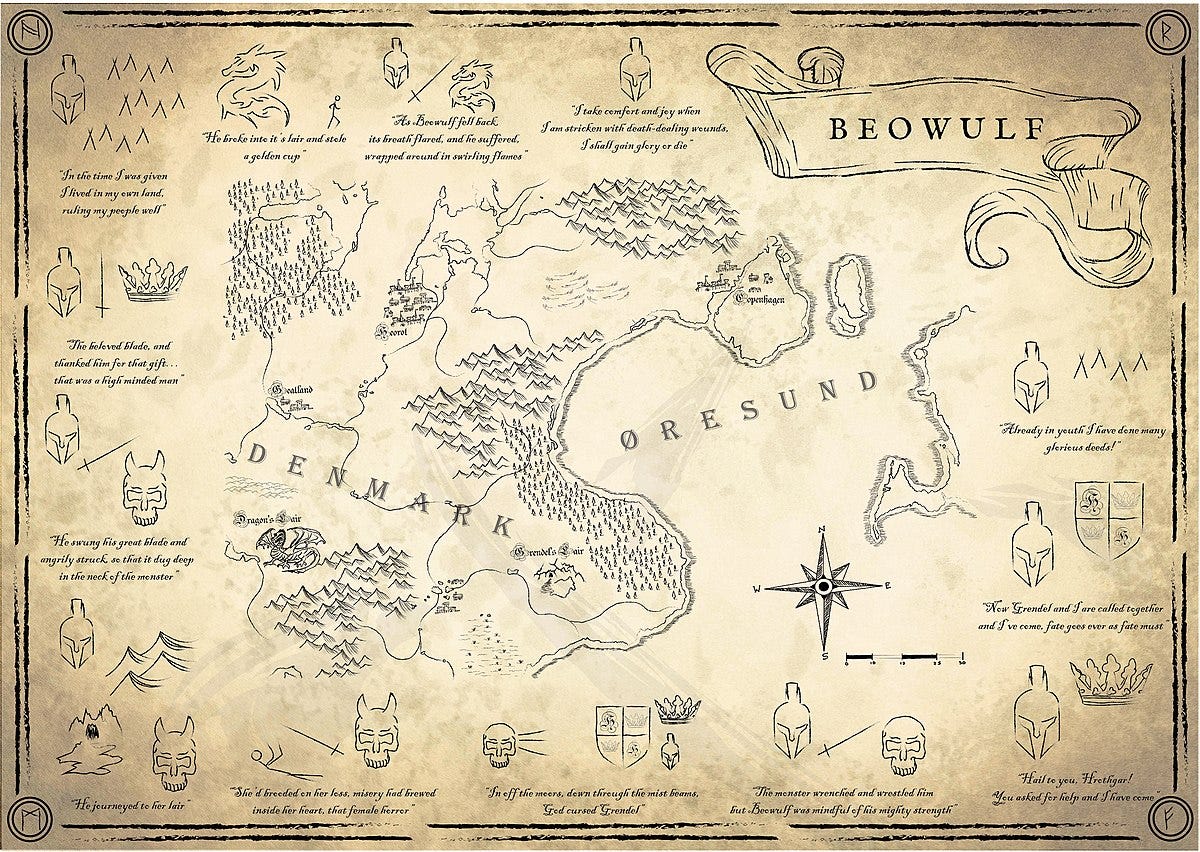Thursday Things is here! This week we live longer with coffee, look for a mystery planet, and read Beowulf.
If you enjoy this edition, please click the heart icon in the header or at the end of the post to let me know.
For medicinal use only. Photo by Lexi Anderson on Unsplash
Don’t do Pluto like that
What is this nonsense?
'Strongest Statistical Evidence Yet' For Planet Nine Has Been Found, Scientist Says
The hunt for the elusive Planet Nine goes on, and new research claims to have the "strongest statistical evidence yet" that there is such a planet orbiting somewhere around the far edges of the Solar System.
That claim was made to Andrew Griffin at The Independent by astronomer Konstantin Bogytin from the California Institute of Technology (Caltech). Bogytin has been responsible for many of the previous studies trying to prove the existence of the ninth planet.
The ninth planet was found in 1930. It’s name is Pluto.
In this latest piece of research, Bogytin and his colleagues tracked the movement of Trans-Neptunian Objects or TNOs: variously sized celestial bodies beyond Neptune's orbit, which include
dwarf[We don’t say “dwarf planet” here. It’s offensive. — ThTh]planets like Pluto and Eris.Specifically, the team analyzed TNOs that have previously been overlooked because of their unstable movements, caused by the gravity of Neptune. This instability makes their paths harder to interpret, but the researchers wanted to take on the challenge.
This data was plugged into simulations and combined with known forces from other planets, passing stars, and the galactic tide coming from the Milky Way – the push and pull of the galaxy itself.
Two sets of simulations were run, one assuming Planet Nine was where astronomers think it might be, and one assuming Planet Nine doesn't exist.
I think you mean Planet Ten.
You can read the science details here: https://arxiv.org/abs/2404.11594
It is the official policy of Thursday Things that Pluto was, is, and always shall be a planet. Pluto forever!
Pluto - the Ninth Planet. (Image: NASA/Johns Hopkins University Applied Physics Laboratory/Southwest Research Institute)
Coffee for life
Would you like to live up to two years longer than you might otherwise?
Then pour a cup of coffee!
2 extra years of life: Drinking coffee daily shows benefits for aging
A new scientific review suggests that regular coffee consumption could extend your healthy lifespan by nearly two years, challenging long-held beliefs about coffee’s impact on aging.
Researchers from Portugal have uncovered compelling evidence that drinking coffee isn’t just a pleasant ritual, but potentially a powerful tool for maintaining health as we get older. The study, published in Ageing Research Reviews, reveals that moderate coffee drinking could be a simple yet effective way to support healthy aging.
The review analyzed over 50 scientific studies, focusing specifically on how coffee impacts human health and aging. The most striking finding? Regular coffee consumption can add an average of 1.8 years to a person’s healthy life expectancy — and this benefit appears to be equally powerful for both men and women.
Well, that’s good news out of Portugal.
I wonder if there is any reason to have a second cup?
Indeed, there is!
However, coffee’s potential isn’t just about living longer — it’s about living better. The research suggests that coffee may help reduce the risk of several chronic diseases, including cardiovascular issues, cancer, respiratory diseases, and cognitive decline.
Amazing! How can coffee be so awesome?
It’s not just about caffeine. Coffee contains over 2,000 potentially bioactive compounds, including polyphenols that may offer antioxidant and anti-inflammatory benefits. These compounds could help regulate insulin sensitivity and reduce neuroinflammation.
Experts recommend moderation: the European Food Safety Authority considers three to five cups of coffee per day (up to 400mg of caffeine) safe for most adults.
Read all the science details here, perhaps over another of your three to five daily cups of coffee: Impact of coffee intake on human aging: Epidemiology and cellular mechanisms
Beowulf, baby!
If you’ve been thinking “I’d sure like to do a guided reading of Beowulf and related Germanic texts, maybe sometime in the spring” then this is your lucky day!
New Online Course: Reading Beowulf
We have a new online course: Reading Beowulf – Explore this Old English epic in its entirety through a guided readings course that delves into this monumental work alongside related Old Germanic texts. Covering approximately 600 lines per session, this course equips you with the essential tools and historical context to fully understand and appreciate the richness of this legendary work.
Six sessions starting Saturday, March 8, 2025
Live 90-minute sessions with the instructor every week
Sessions start at 1:00pm Eastern U.S. Time (6:00pm GMT)
No previous knowledge of Old English is required. All material will be read in translation.
The course is open to all, from complete novices who are curious about Beowulf and are reading it for the first time to more seasoned readers who know the text well.
The course will be accessible, informal, and emphasize discussion.
The reading group format requires that you come to each class having read the allocated lines.
If they ever do find that mysterious Planet Ten, they ought to name it Beowulf.
You can learn more and sign up at: https://medievalstudies.thinkific.com/courses/beowulf
Beowulf was here! Image: Alexl1400 CC:Attribution-Share Alike 4.0 International via Wikimedia
Thank you for reading!
Please click the hearts, leave a comment, and use the share feature to send this issue to a friend who might enjoy it. See you next Thursday!





